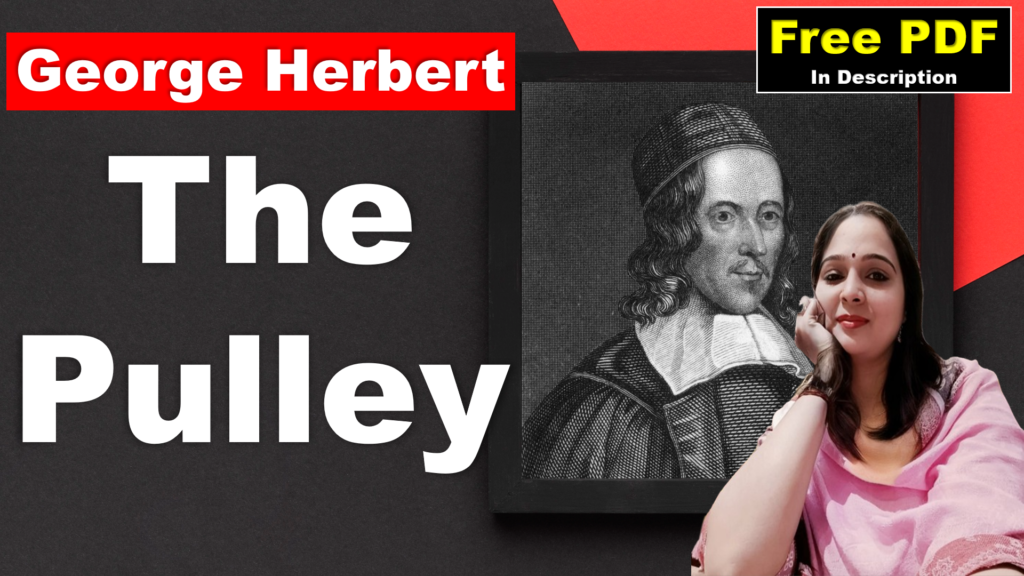
The Pulley by George Herbert: Word Meaning
| Line | Word | Meaning | अर्थ |
| 1 | God | Creator | भगवान |
| 2 | glass of blessings | collection of blessings | आशीर्वादों का संग्रह |
| 3 | pour | flow | बहना |
| 4 | dispersèd lie | scattered all around | चारों ओर बिखरी हुई |
| 5 | Contract | concentrate | समाहित |
| 5 | Into a span | into one man | एक मनुष्य में |
| 6 | strength | power | शक्ति |
| 7 | beauty | elegance | सौंदर्य |
| 7 | wisdom | intelligence | बुद्धि |
| 7 | honor | acknowledge | सम्मान |
| 7 | pleasure | joy | आनंद |
| 8 | stay | stop | रुक |
| 9 | Perceiving | Realizing | महसूस |
| 9 | treasure | wealth | खज़ाना |
| 10 | bottom | deep | निचला |
| 12 | Bestow | give | प्रदान करना |
| 12 | creature | man | प्राणी |
| 13 | adore | worship | पूजा |
| 15 | loser | defeated person | हारने वाला |
| 17 | repining restlessness | anxiety | बेचैनी को दोहराना |
| 18 | weary | tired | थका |
| 19 | goodness | gentleness | अच्छाई |
| 19 | weariness | tiredness | थकावट |
| 20 | My breast | my chest / heart | मेरे सीने से |
The Pulley by George Herbert Summary
The poem “The Pulley” by George Herbert is a meditation on the relationship between God and humanity. In the poem, Herbert imagines God creating man and giving him all the gifts he could possibly want: strength, beauty, wisdom, honor, and pleasure. However, God stops short of giving man the gift of rest, knowing that if he did, man would adore the gifts instead of the Giver.
This poem is a reminder that all the good things in life are ultimately gifts from God. While we can enjoy these gifts, we should never forget that they are not our own and that we should be grateful to God for them. Furthermore, the poem suggests that true happiness and satisfaction can only be found in God, not in the material world.
I found this poem to be very thought-provoking and inspiring. It is a reminder that we should always be grateful for the blessings in our lives and that we should never take them for granted. Furthermore, the poem teaches us that true happiness can only be found in God.
Key Points
Author: The poem was written by George Herbert, a Welsh poet who also worked as an orator and priest.
Metaphysical Poem: “The Pulley” is a metaphysical poem, a type of figurative language that is most commonly associated with John Donne
The Pulley as a Metaphor: The poem uses the pulley as a metaphor to depict humanity’s restless nature and the reason why human beings are incapable of being satisfied
Theme: The poem explores themes of religion and human nature. It provides the reader with an image and idea of how God bestowed various traits on humanity.
Structure and Form: The poem is structured in quintains (five-line stanzas) that follow a structured rhyme scheme
Literary Devices: The poem uses several literary devices, including conceit (a type of figurative language), personification (giving human characteristics to non-human entities), and paradox (a statement that contradicts itself but might be true).
Summary: The poem begins with God creating humankind and giving people every possible blessing but one: “rest”. The longing for a kind of peace one can’t find on earth is just another part of God’s plan to draw humanity back into a divine embrace.
Publication: This poem first appeared in the posthumous collection “The Temple” in 1633





